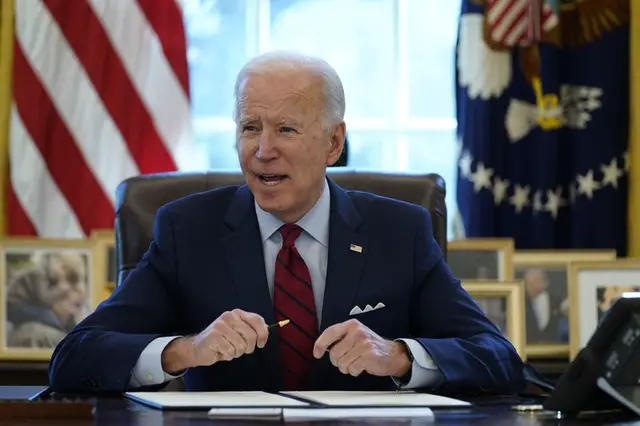Democrats are moving toward using a tool that allows certain budget-related items to bypass the Senate filibuster — a hurdle requiring 60 votes — and pass with a simple majority. Sanders is confident that a minimum wage increase fits within the allowed criteria for what is referred to in Washington lingo as budget reconciliation, though the Senate parliamentarian has final say on what qualifies.
“As you will recall, my Republican colleagues used reconciliation to give almost $2 trillion in tax breaks to the rich and large corporations in the midst of massive income inequality. They used reconciliation to try to repeal the Affordable Care Act and throw 32 million people off the health care they had. They used reconciliation to allow for drilling in the Arctic wilderness,” Sanders said. “You know what? I think we can use reconciliation to protect the needs of working families.”
Senate Majority Leader Chuck Schumer, D-N.Y., said the Senate as early as next week will begin taking the first steps toward getting the COVID-19 relief bill passed through the budget reconciliation process. The goal would be passage by March.
The latest sign that a $15 minimum wage is popular with voters came in November, when more than 60% of voters in conservative-leaning Florida approved an amendment to the state’s Constitution that will raise the minimum wage there from $8.56 an hour to $15 an hour by 2026.
The House passed legislation to gradually increase the minimum wage in the last Congress, but it went nowhere in the GOP-controlled Senate. Opponents argue that a large increase in the minimum wage would lead many employers to cut the number of workers they have on their payrolls.
A 2019 study from the Congressional Budget Office projected that an increase to $15 an hour would boost the wages of 17 million Americans. An additional 10 million workers making more than $15 an hour would see a boost as well. However, about 1.3 million workers would lose their jobs.
“There’s no question that raising the minimum wage, especially to $15, will put some small businesses out of business and will cost a lot of low-wage workers their jobs,” said Neil Bradley, the chief policy officer at the U.S. Chamber of Commerce.
Bradley said there should be a separate debate on the minimum wage, and while the U.S. Chamber of Commerce opposes $15 an hour, “we’re open to a reasonable increase in the minimum wage and that ought to be a topic of discussion. But, you know, including that in the COVID package just imperils the whole thing.”
Mary Kay Henry, international president of the Service Employees International Union, said that increasing the minimum wage would benefit many of the people who have been working on the front lines of the pandemic. That’s why she supports including it in the COVID-19 relief package.
“They’ve been called essential, but they all believe they’ve been treated as expendable or sacrificial because they don’t earn enough to be able to put food on the table and keep themselves and their families safe and healthy,” Henry said.
Henry says nursing home workers, janitors, security guards and home health workers are among the union’s 2 million members.
“The real way to appreciate this work is to raise the minimum wage to $15,” she said.
Most states also have minimum wage laws. Employees generally are entitled to the higher of the two minimum wages. Currently, 29 states and Washington, D.C., have minimum wages above the federal minimum wage of $7.25 per hour.
(AP)
 简体中文
简体中文





